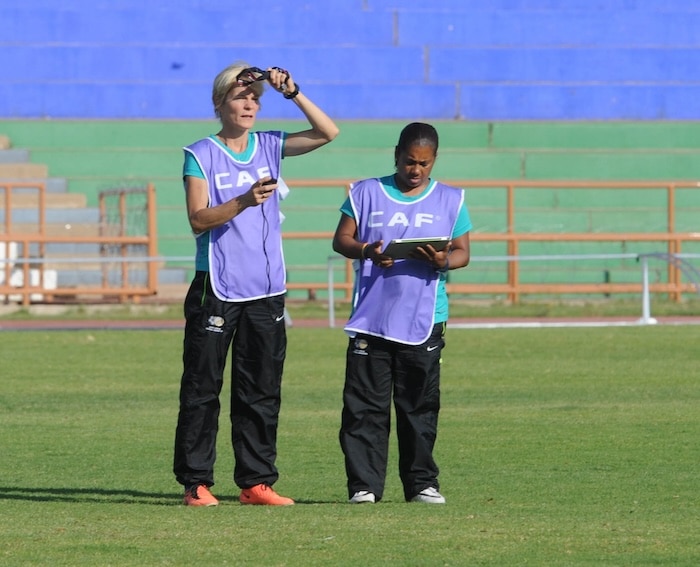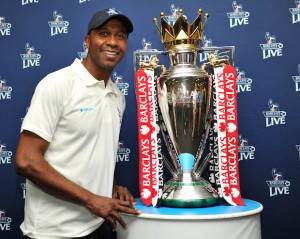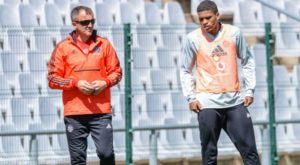Banyana Banyana have a great current golden generation, but who were their early stars of the past, writes Nick Said.
DESIREE ELLIS
The current coach of the side, Ellis (right) was also in the very first fixture the team played under Terry Paine in May 1993, when they crushed Eswatini 14–0.
She would go on to spend almost a decade as a stalwart in the midfield and was the first long-term captain of the national team.
Ellis was a driving force behind early success when the team had nowhere near the support from the association they enjoy now.
In fact, during her playing days, she worked several jobs to put food on the table.
But she stuck it out and made numerous sacrifices. After her playing days were over, she took to coaching, initially as an assistant within the SAFA structures, before taking over the top job from Vera Pauw in 2016.
Her eight years in charge have been nothing short of a triumph to date and she will probably go down in history for her coaching achievements, but it should not be forgotten what a dedicated and effective player she was too.
ANNA MONATE
Another of the ‘originals’, Monate also spent close to a decade in the national team from its inception and was a hugely influential player in the midfield.
She played just about every game up to 2000 and had a big impact as a player and a leader in the team.
Monate retired in 2001, and like Ellis, went on to coach, discovering the likes of future Banyana star Simphiwe Dludlu as a 13-year-old during her time as a tactician at Mamelodi Sundowns.
She was most recently head coach of the University of Johannesburg. She has also worked as part of the national-team setup in the past.
VERONICA PHEWA
Phewa spent 16 years in the national team from her debut in 1998 but had been part of early squads in 1993, when she was only 14 years old.
She was a stalwart of the side for many years and an international ambassador for the country after she and Portia Modise went to Arsenal in 2003.
It was not all happy times, though – she revealed they were not paid by the English club, had to live on handouts, and former men’s national team captain Neil Tovey paid for her airline ticket to get to London.
The striker later turned out for Indiana FC in the United States, so in many ways she was a pioneer for South African women footballers playing abroad, even if back then it was mostly amateur in other countries too.
These days, many players are on contracts that earn them a decent wage. Phewa is currently unemployed but hoping to do her coaching badges.
PORTIA MODISE
The record goal scorer in Banyana’s history, Modise was a superb servant to the game and a star performer.
She was still a teenager when she made her national-team debut in 2000 and was nominated for the FIFA Women’s World Player of the Year five years later, which was won by German legend Birgit Prinz.
She quit the national team in 2008 after a clash with coach August Makalakalane but was recalled when he was sacked.
She went on to play at the 2012 London Olympic Games, where she scored against Sweden with a goal from the halfway line.
Modise became the first African to score 100 international goals when she netted a brace against Algeria in 2014. She retired a year later with 101 goals from 124 caps.
AMANDA DLAMINI
Former national-team captain Dlamini made her debut in 2007 and become a regular on the side for more than a decade.
She made over 100 appearances for the team and is viewed as a steady campaigner and excellent ambassador with great football intelligence. Dlamini has retained these attributes post career and is now a respected analyst on both men’s and women’s football, having also briefly worked at SAFA.
She is part of a generation that began to professionalise the national team by raising standards around training, and great strides have been made in performance. Unfortunately, she retired before the real success of women’s soccer kicked in.





